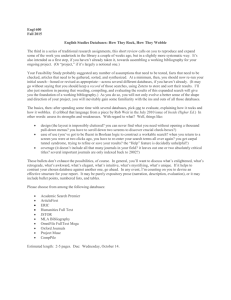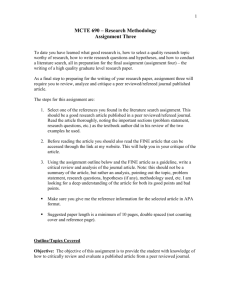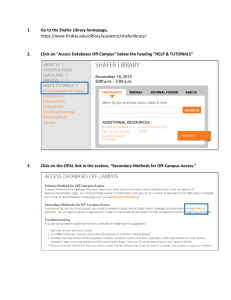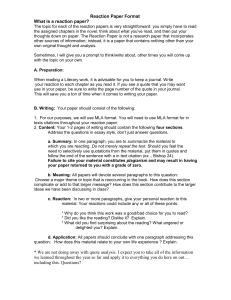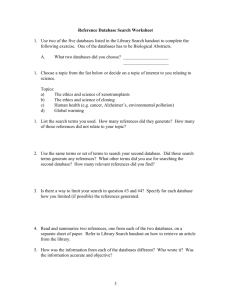Week 2 Day 1 PowerPoint
advertisement
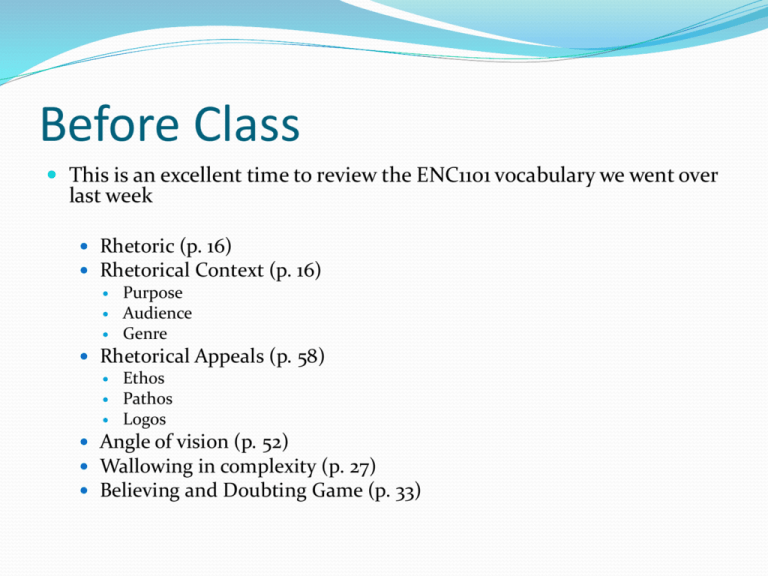
Before Class This is an excellent time to review the ENC1101 vocabulary we went over last week Rhetoric (p. 16) Rhetorical Context (p. 16) Purpose Audience Genre Rhetorical Appeals (p. 58) Ethos Pathos Logos Angle of vision (p. 52) Wallowing in complexity (p. 27) Believing and Doubting Game (p. 33) Today’s Goals Continue generating ideas for research Learn how to use the FIU Library databases Your Research Ideas Endangered wildlife (look for specific animals or ecosystems) Women’s rights & status in modern society Standardized testing (effects and alternatives) Teacher merit pay Stem cell research Human cloning Bullying & cyberbullying Freedom of speech (as a national or international issue) Cognitive/behavioral psychology (look for specific issues or effects to investigate) Steroid usage and athletes Obesity (classification as a disease and the epidemic in America) Your Research Ideas Technology and its uses for education Architectural preservation (look for specific examples or instances) Gas prices (look at this as a social and political issue) Political turmoil/corruption in Venezuela Ethical issues in medical research/practices Violence in video games Terrorist groups and treatment Space flight (consider this as an issue of economics as wells as politics) Racial violence and discrimination in America Alternative fuels & electric cars Trade embargos and Cuba Overcrowding and overly punitive prison sentences in America Economic issues Language learning (consider this as an educational as well as social issue) Group Activity: Research Brainstorm In your unit 1 groups (make sure to write down your group number!) Brainstorm 10 possible research topics that you could use in this class. These must be arguable issues that do not fall in to the previously mentioned “Topics to avoid” or topics from our Believing and Doubting Game For each possible topic, list one issue or problem you could investigate and the type of source that you think will provide you with the most helpful information: primary, secondary, peer reviewed, newspapers, magazines, academic journals, etc. Journal Entry 2 Focus: Research Experience Reflection Take a few minutes to reflect on your experience with research in the past. If possible, focus on academic research that you did in high school or college. Do you have a preference for primary or secondary research? Do you find one more interesting than another? Why? How do you think you will use research in your current major or career of choice? What do you think of the type of writing found in peer reviewed journals? Was there any particular research experience that stood out to you for being particularly interesting, difficult, or unique? Library Databases Advantages Disadvantages Easiest way to find/access peer The sheer number of sources reviewed sources Access to thousands of expensive academic journals for free The most credible databases/sources you will find anywhere (You will be required to use at least 3 peer reviewed sources from licensed databases for your Exploratory Narrative) can be overwhelming Many sources will have pedantic language that is hard to read Different databases will have different criteria and search protocols that will produce varied results and take individual time to learn to use Recommended Library Databases Easy to use Academic Search Complete OmniFile Full Text Mega Academic OneFile LexisNexis: Academic ProQuest Specific Use “Browse by Subject” in the left pane of the Research Sources page Comprehensive (but harder to use) JSTOR Project MUSE Research Strategies Eliminate function words or words that will appear in too many contexts, such as “the” or “a” or “first” When you want to find an exact phrase, enter it in quotation marks (Note: this will severely limit search results) Enter search terms in their order of importance rather than the order they will appear in the sentence (This priorities the first words for certain search engines) Use Boolean operators: (special words that affect search conditions. Do not use these except for their listed function) AND: only sources containing all the words it separates OR: sources containing any of the words it separates NOT: narrow search results to not contain the word following it Secondary Research Strategies Working Bibliography As you find sources, write down relevant information so you can find them again when necessary Make sure to indicate title, author, and in what search engine or location you found the article EW p. 183 has suggestions for additional material Quote Bank Read through each article highlighting and annotating information relevant to your argument. More information here is always better. You can eliminate extraneous material later. After you read each article, write a shortened version of any quote or important information in your quote bank After you have gone through all sources, read through your quote bank and see if you have sufficient material to make your argument MLA Citations Best references: Everyday Writer Purdue Online Writing Lab: http://owl.english.purdue.edu/owl/resource/747/01/ MLA Handbook Group Activity : Finding Sources In your unit 1 groups For each student’s topic, find one source from the library database that the student could use for their exploratory narrative. (There should be one source found for each person in the group) For each source, answer the following: What is the title and who is the author of the source? What is the main argument or thesis of the source? (The abstract may be helpful here) 3. What database did you find the source in? 4. How would you classify this source? (Would it be considered primary or secondary? Is its stance objective or subjective? ) 1. 2. Homework Find the first source you can use for your Exploratory Narrative. Bring a printed copy of the source to class on Friday Note: this should be a different source than you found in class today. However, feel free to save the source you found in class for later use with your Exploratory Narrative Read A&B p. 251-258 If necessary, review: Primary Source (p. 509) Secondary Source (p. 509) Peer Reviewed Source (p. 13) Source Evaluation Criteria (p. 527) Reliability Credibility Angle of Vision Degree of Advocacy Currency (For web sources. P. 536)

